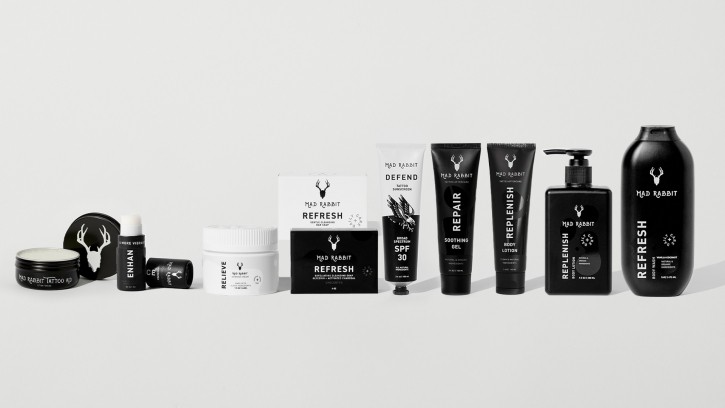Indie tattoo skin care brand transitions to completely vegan reformulation

Last month, indie tattoo skin care and aftercare product brand Mad Rabbit Tattoo announced it is relaunching a reformulation of its Tattoo Balm, ensuring the entire product collection now contains a completely vegan formula. The US-based brand launched in 2019 significantly changed its original product formulation. It replaced the hero ingredient beeswax with plant-based Carnauba wax to ensure its product offering collection is now wholly vegan and more environmentally sustainable.
To learn more about the Tattoo Balm reformulation process, the potential environmental impact of the decision to eliminate beeswax from its product formula, and the brand’s hopes for a more sustainable future through its product offerings, CosmeticsDesign spoke with Erin Murray, SVP of Marketing for Mad Rabbit Tattoo for her insights.
Transitioning to a vegan reformulation
When considering the decision to reformulate, the Mad Rabbit Tattoo team weight consumer input heavily throughout the process. As the brand’s products have already been in production for several years, the move to reconfigure the Tattoo Balm formula configuration was not taken lightly.
“Our consumer was asking for us to consider this in all of our formulations, but we needed to ensure the customer experience was as good, if not better than our hero formulation,” shared Murray. “We are a very community-driven brand and strive to pivot to the consumers demands where it makes sense,” she added, and “more and more the consumer is sensitive to the qualities of formulation for the brands they choose to use and it’s incredibly important for us to lead this within the category.”
As the brand was founded with a sustainable-first mindset, the decision to transition to a vegan formulation fit well into the brand’s mission. However, the logistics of executing the concept needed to be facilitated to ensure product efficacy was preserved. The formulators turned to plant-based Carnauba wax to deliver the quality results its consumers expect while simultaneously eliminating the need for beeswax in the formulation with the specific consideration that Carnauba wax “has a similar makeup to beeswax, which makes it a natural first direction when moving towards vegan alternatives,” Murray explained.
Replacing beeswax with Carnauba wax
Carnauba wax “is known for its high melting point and high shine, making it a popular ingredient in a wide range of personal care and cosmetic products,” said Murray. Additionally, she added, “it is biodegradable and does not contain any harmful chemicals or toxic substances, making it a safe and eco-friendly alternative to other synthetic waxes,” and is “considered to be a sustainable product because the Brazilian palm tree that it is harvested from has a rapid growth rate and can regrow quickly after being harvested.”
These properties qualified Carnauba wax as an excellent candidate to replace beeswax in Mad Rabbit Tattoo’s original formulation, but the reformulation process was not without challenges. For example, “it took us several iterations to ensure the customer experience was superior, which required us to relook at the stability of the product,” said Murray.
The process also allowed the brand to reexamine and address “additional concerns from our pre-existing formula, including heat sensitivity,” and overcome those issues for the final product relaunch.
A more sustainable future
The brand is excited to move forward with the reformulation launch as “sustainable vegan formulations are the future of personal care,” shared Murray. “As a sustainable-first brand,” she added, “it’s not only important for our packaging, but everything that goes in them to be as sustainable as possible.”
In making the transition, Mad Rabbit Tattoo hopes to set an example for other brands to follow suit and consider reformulating their product collections regarding sustainability. She explained, “there are many brands rethinking their formulation and sustainability initiatives as the consumer demand is now driving for change which also requires retailers to rethink their brand partnership strategies.”
The commitment to move “to vegan formulations also reduces our carbon footprint and supports climate change,” she added, and “in order to gain market share or withstand market penetration, all brands will need to make significant changes across vegan and sustainable initiatives” soon.









![Chinese study highlights mental health challenges in atopic dermatitis, emphasising holistic patient care. [Getty Images]](https://www.cosmeticsdesign-europe.com/var/wrbm_gb_food_pharma/storage/images/_aliases/wrbm_tiny/publications/cosmetics/cosmeticsdesign-asia.com/headlines/formulation-science/chinese-research-linking-atopic-dermatitis-to-mental-health-underscores-need-for-holistic-care/17040623-1-eng-GB/Chinese-research-linking-atopic-dermatitis-to-mental-health-underscores-need-for-holistic-care.jpg)








